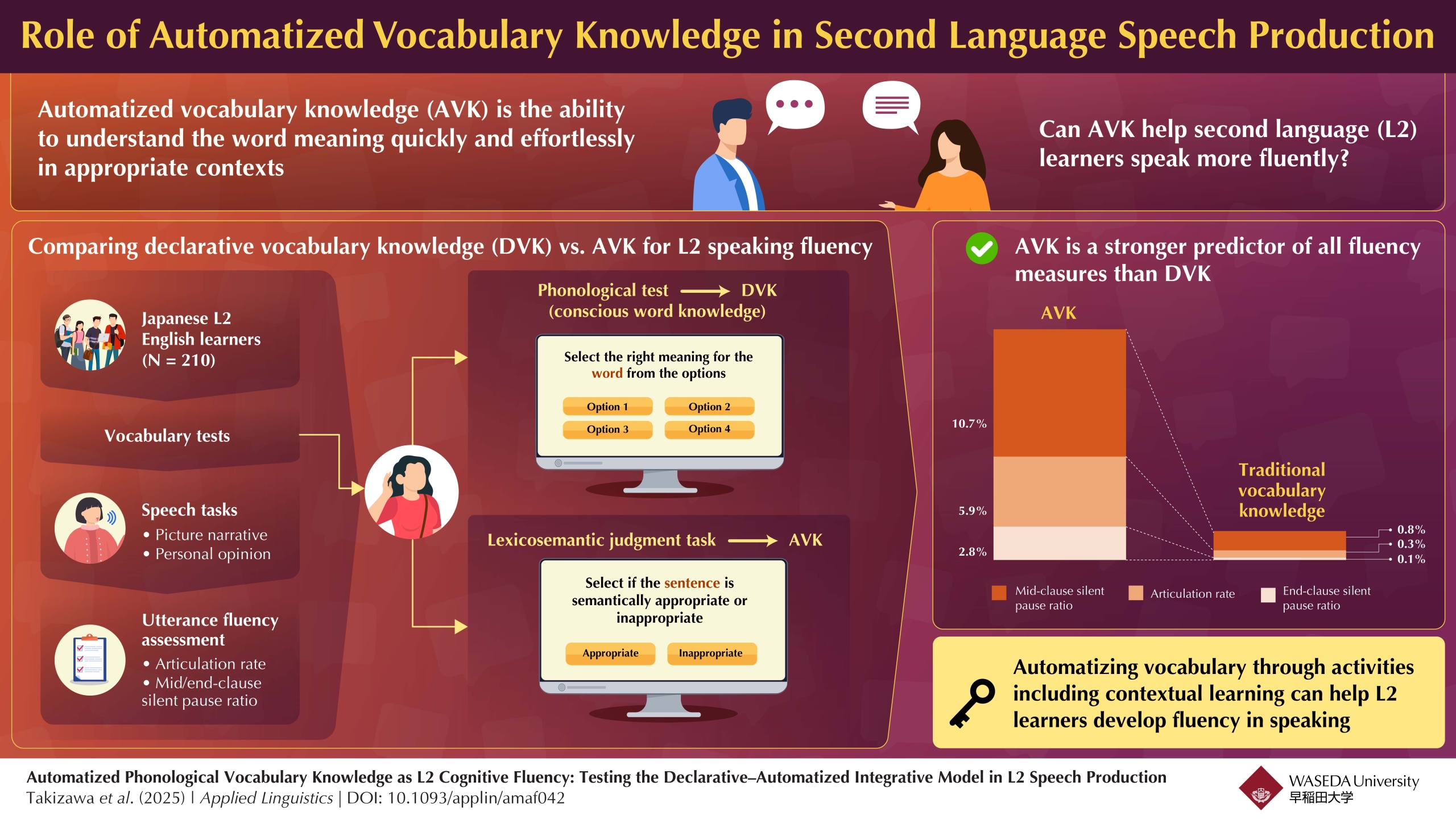Automatized Vocabulary Knowledge in Predicting Speech Fluency
Tue, Jul 8, 2025-
Tags
Automatized Vocabulary Knowledge in Predicting Speech Fluency
To improve fluency, learners should move beyond memorizing words and train themselves to access words quickly and appropriately in contexts
While automatized vocabulary knowledge has been shown to strongly predict general listening ability, its role in speech production remains unknown. Now, researchers have compared conscious recognition of simple word meanings (declarative knowledge) with instant, automatic access to contextualized word meanings (automatized knowledge) in Japanese students learning English as a second language. The findings revealed that automatized vocabulary knowledge better predicts fluency, and practicing vocabulary in real-life contexts may help learners speak more smoothly and confidently.

Image title: Automatized vocabulary knowledge (AVK) predicts second language fluency in Japanese English learners
Image caption: Researchers revealed that the AVK is a stronger predictor of speaking fluency compared to declarative vocabulary knowledge.
Image credit: Mr. Kotaro Takizawa from Waseda University, Japan
License type: Original content
Usage restrictions: Cannot be reused without permission
When learning a second language (L2), many are likely familiar with the challenge of memorizing vocabulary, only to struggle with recalling and using it fluently in speech. Studies have found that speaking fluently in L2 depends not only on knowing what words mean but also on how quickly and automatically you can access and use them appropriately in contexts. This ability to retrieve contextually appropriate word meanings without conscious effort is known as automatized vocabulary knowledge (AVK).
In a new study, a team of researchers led by Mr. Kotaro Takizawa from Waseda University, Japan, along with Prof. Kazuya Saito and Dr. Yui Suzukida from University College London and Tohoku University, Mr. Satsuki Kurokawa and Dr. Takumi Uchihara from Tohoku University, Japan, compared AVK with declarative vocabulary knowledge (DVK) to explore the extent to which AVK predicts L2 utterance fluency. Their findings were published in the journal of Applied Linguistics on July 7, 2025.
“Our study addressed an outstanding question regarding the vocabulary knowledge that best supports automaticity in L2 speech production,” says Takizawa.
To investigate the relationship between each type of vocabulary knowledge and speaking fluency, the researchers assessed the AVK and DVK of 210 university students who were learning English as L2.
To evaluate DVK, participants were asked to match spoken English words with their Japanese meanings with options, capturing decontextualized word knowledge stored in memory. In contrast, AVK was evaluated by having participants listen to short English sentences and determine whether they were meaningful, testing their ability to process contextualized word meanings in real time. Next, participants took part in two speaking exercises: a narrative task based on a picture sequence and a personal monologue in response to an on-screen prompt. Further, the researchers measured fluency by analyzing three key indicators: articulation rate, which reflects how quickly a person speaks; mid-clause silent pauses, or pauses that occur within a clause; and end-clause silent pauses, which occur at the end of a clause.
Across all measures, AVK was a significantly stronger predictor of L2 speaking fluency than DVK, which showed little to no effect. Notably, mid-clause silent pauses—which indicate difficulty in linguistic encoding, such as retrieving words while speaking—were more strongly linked to AVK, suggesting that the ability to automatically access vocabulary in context plays a crucial role in fluent speech.
This finding has important implications for language learning, highlighting that fluency does not come simply from knowing more words but from sophisticating them so that they can be retrieved quickly and confidently—skills that can be developed through continuing practice and exposure to language in context. The findings suggest that learners first familiarize themselves with simple word forms and their meanings and then gradually transition to how words are used in real-world, sentence-level contexts.
“Our findings strongly support the view that building simple form-meaning connections is only the first step in L2 vocabulary learning. To become orally fluent, learners need to automatize these connections through consistent practice and meaningful exposure,” concludes Takizawa.
Reference
Title of original paper: Automatized phonological vocabulary knowledge as L2 cognitive fluency: Testing the declarative–automatized integrative model in L2 speech production
DOI:10.1093/applin/amaf042
Journal: Applied Linguistics
Article Publication Date: March 27, 2025
Authors: Kotaro Takizawa1, Kazuya Saito2,3, Yui Suzukida2,3, Satsuki Kurokawa3, and Takumi Uchihara3
Affiliation:
1Waseda University, Japan
2University College London, U.K.
3Tohoku University, Japan
About Mr. Kotaro Takizawa
Mr. Kotaro Takizawa is a Ph.D. student at Waseda University specializing in English language education and second language acquisition. His research focuses on second language speaking performance, particularly vocabulary use, oral fluency, and phraseological competence. He is a member of TESOL Quarterly’s graduate student editorial board. He has published over 10 papers in international journals and is actively involved in applied linguistics, psycholinguistics, and speech and language processing research.














